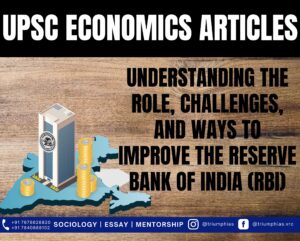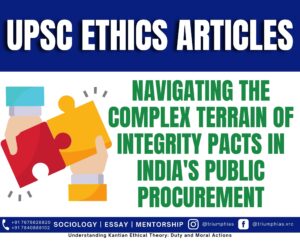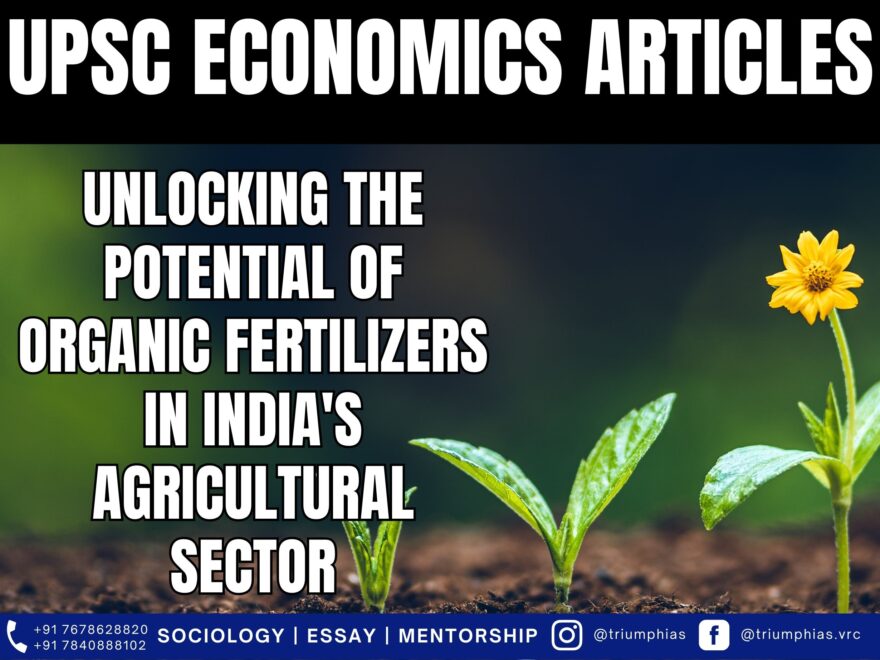Organic Fertilizer: Benefits for Agriculture
(Relevant for Economics Section of General Studies Paper Prelims/Mains)
Organic Fertilizer: Benefits for Agriculture
An organic fertilizer is a fertilizer that is derived from organic sources, including organic compost, cattle manures, poultry droppings and domestic sewage.
Biofertilizers and Organic Manure:
- Biofertilizers: Biofertilizers consist of living microorganisms affixed to solid or liquid carriers. These microorganisms are instrumental in augmenting soil and crop productivity on cultivable land. Examples include Rhizobium, Azospirillum, Azotobacter, Phosphobacteria, Blue Green Algae (BGA), Mycorrhiza, and Azolla.
- Organic Manure: Conversely, organic manure pertains to partially decomposed organic matter, such as digestate derived from a biogas plant, compost, and vermicompost. These substances furnish nutrients to the soil and crops, thereby enhancing crop yield.
Potential of organic fertilizer in India:
Leveraging Municipal Solid Waste:
- With India generating more than 150,000 tonnes of municipal solid waste (MSW), there exists a significant opportunity to transform the agricultural sector by employing this waste resourcefully.
- Assuming an 80% collection efficiency and considering that 50% of MSW comprises organic matter, India generates approximately 65,000 tonnes of organic waste daily. Even if half of this is redirected toward the biogas industry, the government can capitalize on this by reducing the reliance on fossil fuel imports and fertilizers.
Harnessing Biogas Effluents:
- The organic fertilizer, also known as digestate, derived from biogas plants, holds substantial value. Furthermore, biogas can serve various purposes, including heating, electricity generation, and even vehicular use (with suitable upgrades). In tandem, digestate can contribute to realizing the vision of a second green revolution.
Enhancing Soil Fertility:
- Digestate can also enrich the soil with organic carbon, a crucial resource for rejuvenating soil quality, in addition to its conventional nutrient content.
- Currently, India’s bio-fertilizer production stands at just over 110,000 tonnes.
- Top of Form
There has been significant rise of organic farming sector due to growing awareness about the harmful effects of synthetic fertiliser on soil, rising health concerns, expanding urban population base and an increased consumer expenditure on food goods. Further they have the potential to eliminate the usage of synthetic fertilisers completely.
Sample Question for UPSC Sociology Optional Paper:
Question 1: Discuss the sociological implications of the transition from synthetic to organic fertilizers in India.
Short Answer: The transition to organic fertilizers reflects growing environmental and health consciousness, which could potentially shift societal norms around sustainable farming and food consumption, influencing both rural and urban lifestyles.
Question 2: How can organic fertilizers contribute to waste management in Indian cities?
Answer: Organic fertilizers offer a sustainable solution to managing municipal solid waste, turning organic waste into a valuable resource for agriculture, thereby contributing to circular economy principles and affecting social perceptions of waste.
Question 3: What is the role of organic fertilizers in promoting sustainable agricultural practices in India?
Answer: Organic fertilizers enhance soil fertility and can be derived from renewable resources like biogas and municipal waste, thus promoting sustainability and potentially changing farmer practices and consumer choices towards more ecologically responsible options.
Related Blogs …
 |
 |
To master these intricacies and fare well in the Sociology Optional Syllabus, aspiring sociologists might benefit from guidance by the Best Sociology Optional Teacher and participation in the Best Sociology Optional Coaching. These avenues provide comprehensive assistance, ensuring a solid understanding of sociology’s diverse methodologies and techniques.
Organic Fertilizer, Biofertilizers, Organic Manure, Agriculture, Soil Fertility, Sustainable Farming, Biogas, Municipal Solid Waste, Digestate, India, Green Revolution, Synthetic Fertilizers, Organic Fertilizer, Biofertilizers, Organic Manure, Agriculture, Soil Fertility, Sustainable Farming, Biogas, Municipal Solid Waste, Digestate, India, Green Revolution, Synthetic Fertilizers

Choose The Best Sociology Optional Teacher for IAS Preparation?
At the beginning of the journey for Civil Services Examination preparation, many students face a pivotal decision – selecting their optional subject. Questions such as “which optional subject is the best?” and “which optional subject is the most scoring?” frequently come to mind. Choosing the right optional subject, like choosing the best sociology optional teacher, is a subjective yet vital step that requires a thoughtful decision based on facts. A misstep in this crucial decision can indeed prove disastrous.
Ever since the exam pattern was revamped in 2013, the UPSC has eliminated the need for a second optional subject. Now, candidates have to choose only one optional subject for the UPSC Mains, which has two papers of 250 marks each. One of the compelling choices for many has been the sociology optional. However, it’s strongly advised to decide on your optional subject for mains well ahead of time to get sufficient time to complete the syllabus. After all, most students score similarly in General Studies Papers; it’s the score in the optional subject & essay that contributes significantly to the final selection.
“A sound strategy does not rely solely on the popular
Opinion of toppers or famous YouTubers cum teachers.”
It requires understanding one’s ability, interest, and the relevance of the subject, not just for the exam but also for life in general. Hence, when selecting the best sociology teacher, one must consider the usefulness of sociology optional coaching in General Studies, Essay, and Personality Test.
The choice of the optional subject should be based on objective criteria, such as the nature, scope, and size of the syllabus, uniformity and stability in the question pattern, relevance of the syllabic content in daily life in society, and the availability of study material and guidance. For example, choosing the best sociology optional coaching can ensure access to top-quality study materials and experienced teachers. Always remember, the approach of the UPSC optional subject differs from your academic studies of subjects. Therefore, before settling for sociology optional, you need to analyze the syllabus, previous years’ pattern, subject requirements (be it ideal, visionary, numerical, conceptual theoretical), and your comfort level with the subject.
This decision marks a critical point in your UPSC – CSE journey, potentially determining your success in a career in IAS/Civil Services. Therefore, it’s crucial to choose wisely, whether it’s the optional subject or the best sociology optional teacher. Always base your decision on accurate facts, and never let your emotional biases guide your choices. After all, the search for the best sociology optional coaching is about finding the perfect fit for your unique academic needs and aspirations.
To master these intricacies and fare well in the Sociology Optional Syllabus, aspiring sociologists might benefit from guidance by the Best Sociology Optional Teacher and participation in the Best Sociology Optional Coaching. These avenues provide comprehensive assistance, ensuring a solid understanding of sociology’s diverse methodologies and techniques. Sociology, Social theory, Best Sociology Optional Teacher, Best Sociology Optional Coaching, Sociology Optional Syllabus.
Best Sociology Optional Teacher, Sociology Syllabus, Sociology Optional, Sociology Optional Coaching, Best Sociology Optional Coaching, Best Sociology Teacher, Sociology Course, Sociology Teacher, Sociology Foundation, Sociology Foundation Course, Sociology Optional UPSC, Sociology for IAS,
Follow us :


https://t.me/VikashRanjanSociology
Find More Blogs
|
Scope of the subject and comparison with other social sciences |
|||
|
|
|
|
Modernity and social changes in Europe |


